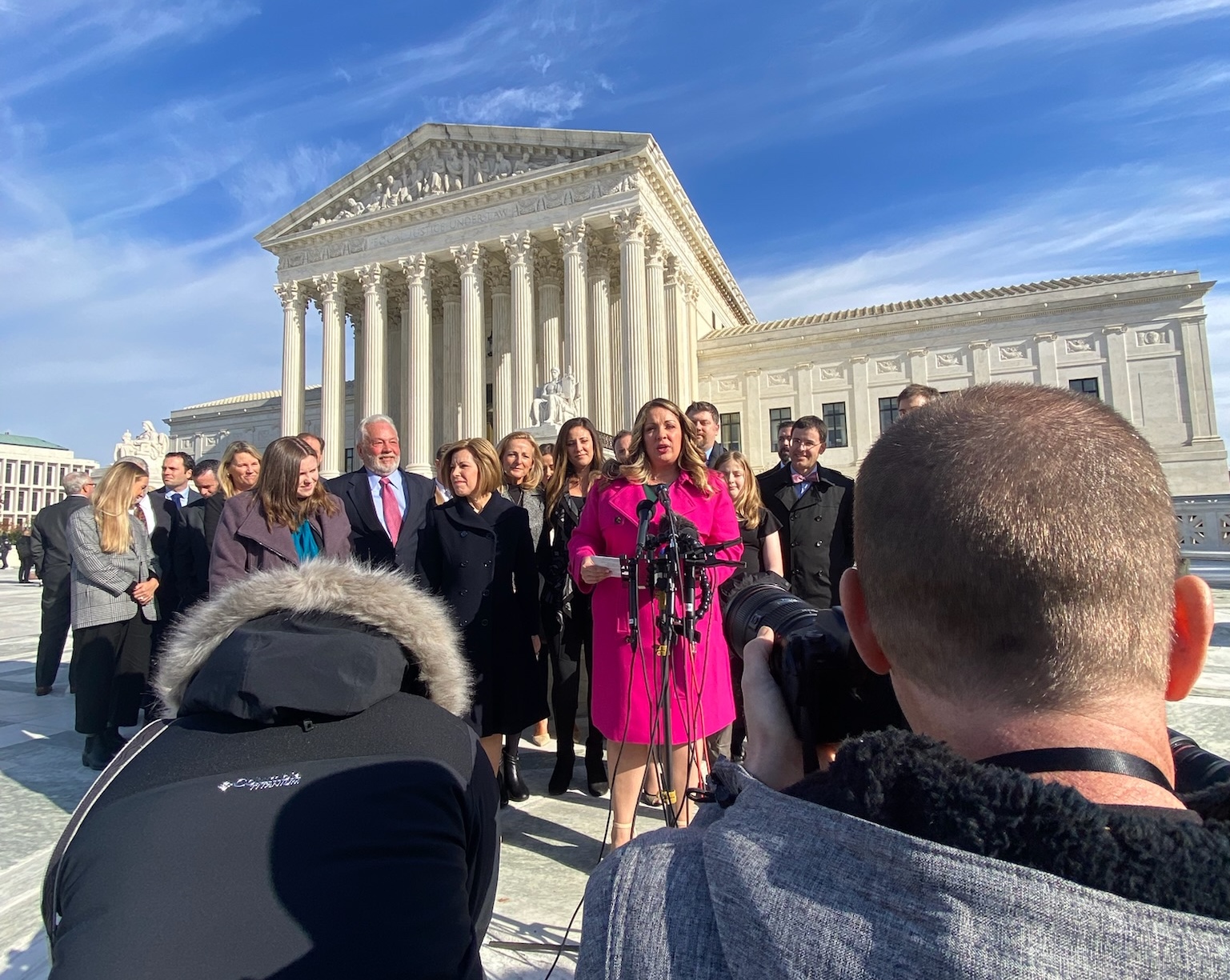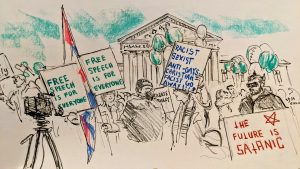ARGUMENT ANALYSIS
Conservative justices seem poised to side with web designer who opposes same-sex marriage

on Dec 5, 2022 at 7:18 pm

The Supreme Court heard oral argument on Monday in the case of Lorie Smith, a website designer and devout Christian who wants to expand her business to include wedding websites – but only for opposite-sex couples. Smith is challenging a Colorado law that prohibits most businesses from discriminating against LGBTQ customers. Requiring her to create websites for same-sex weddings, she argues, would violate her right to freedom of speech.
At the oral argument, Justice Sonia Sotomayor asserted that a ruling for Smith would be the first time that the Supreme Court had ruled that “commercial businesses could refuse to serve a customer based on race, sex, religion, or sexual orientation.” But Chief Justice John Roberts countered that the Supreme Court has never approved efforts to compel speech that is contrary to the speaker’s belief, and his five conservative colleagues signaled that they were likely to join him in a ruling for Smith.
Representing Smith, lawyer Kristen Waggoner emphasized that Smith “decides what to create based on the message, not who requests it.” Smith is not asking the Supreme Court, she emphasized, to create new law. Instead, she assured the justices, she is only asking them to apply their existing precedent. Under the Supreme Court’s 1995 decision in Hurley v. Irish-American Gay, Lesbian, & Bisexual Group, holding that Massachusetts could not require the private organizers of Boston’s St. Patrick’s Day parade to allow an LGBTQ group to march in the parade, the question before the court is a simple two-part test: Is the good or service involved speech, and – if so – is the message affected by the speech it was required to accommodate? The answer in this case to both questions, Waggoner concluded, is yes.
Colorado Solicitor General Eric Olson told the justices that the law at the center of the case, known as a public-accommodation law because it requires businesses that serve the public to serve everyone, merely targets discriminatory sales, rather than a speaker’s message. A store, he noted, could decide that it will only sell Jewish-themed items, but it can’t refuse to sell those items to Muslim or Christian customers. And he warned that the exemption that Smith is seeking is “sweeping”: It would apply not only to sincere religious beliefs like Smith’s, he said, but also to all kinds of racist, sexist, and bigoted claims.
The court’s more liberal justices expressed doubt about whether, in creating a wedding website, Smith would be expressing a message at all. Noting that two of her clerks are engaged to be married, Justice Elena Kagan observed that the clerks’ wedding websites contain similar features – for example, the couples’ names, their wedding dates, and links to things like the schedules for the wedding weekend and the couples’ registries. “They’re not particularly ideological or particularly religious,” Kagan said. “They’re not particularly anything.” Therefore, Kagan suggested, the dispute in Smith’s case is not about the content of the speech, but instead Smith’s resistance to its use in a same-sex wedding.
Waggoner pushed back, telling Kagan that Smith’s objection does not stem from how the site would be used or by whom, but instead from the fact that Colorado’s public-accommodation law would require her to create a message that she believes to be false.
Sotomayor also questioned the idea that Smith would be creating a message. When Waggoner asserted that the message of the wedding website was the invitation to celebrate a couple’s marriage, Sotomayor was skeptical. Smith, she insisted, would not be sending the invitation; the couple who is being married sends the invitation.
Sotomayor then moved on to a topic that was the focus of considerable attention for the more liberal justices: whether Smith’s proposed rule would allow businesses to refuse to serve other groups protected by anti-discrimination laws. Sotomayor asked whether a designer could refuse to create wedding websites for interracial couples or for people with disabilities who want to marry.
Justice Ketanji Brown Jackson offered another hypothetical: the case of a shopping-mall photography business that wants to offer sepia-toned portraits with Santa Clause, evoking the 1946 classic “It’s a Wonderful Life” – but only for white children.
Waggoner countered that such a scenario would be different, and not protected by the First Amendment because the speaker’s objection “is not contained in” the photograph that the photographer would produce. But in any event, she continued, the Supreme Court’s First Amendment case law has protected speech that many people would regard as “vile.”
Waggoner’s response did not seem to satisfy the liberal justices, but Justice Amy Coney Barrett was more receptive to Waggoner’s argument that Smith’s decision about whether to create a website was based on the message, rather than the people requesting it. She offered Waggoner two hypotheticals involving websites that would conflict with Smith’s beliefs about marriage. The first involved an opposite-sex couple who wanted their website to include a statement that they believe that concepts of gender are irrelevant to their relationship, and the second involved an opposite-sex couple who wanted to include the story of their relationship, which began while they were married to other people. In both of those cases, Waggoner agreed, Smith would decline to create the websites.

Demonstrators march in front of the Supreme Court on Monday morning before the argument in 303 Creative LLC v. Elenis. (William Hennessy)
Justice Samuel Alito parried the liberal justices’ suggestion that, if Smith prevails, it would open the door for other exemptions from public-accommodations laws, including for discrimination based on race. He noted that in the Supreme Court’s 2015 decision in Obergefell v. Hodges, establishing a constitutional right to same-sex marriage, Justice Anthony Kennedy had recognized that opponents of same-sex marriage could continue to oppose it and should enjoy First Amendment protection to do so. That recognition, Alito suggested, distinguishes opposition to same-sex marriage from, for example, opposition to interracial marriages.
Brian Fletcher, the principal deputy solicitor general who argued on behalf of the Biden administration in support of Colorado, resisted any effort to carve out an exemption for same-sex marriage. The Supreme Court’s First Amendment cases, he argued, do not distinguish between “views we find odious and those we respect.” He noted that in 1976, the Supreme Court ruled that private schools may not discriminate based on race. But if Smith prevails, he posited, a private school could exclude some children by arguing that the messages that it teaches “change when we express them to students of a different race.”
Kagan raised another concern about the scope of Smith’s proposed rule – specifically, what other businesses would be able to claim an exemption from anti-discrimination laws. For example, Kagan asked, would a ruling for Smith also allow a vendor to refuse to provide chairs for same-sex weddings?
Justice Brett Kavanaugh, who is often a key vote in closely divided cases, echoed Kagan’s concern. If you win, he told Waggoner, the Supreme Court’s next case will involve the caterer who objects to providing the food for same-sex weddings. Kavanaugh later referred to a “friend of the court” brief filed by a group of First Amendment scholars that drew a line between businesses who create speech and cannot be compelled to serve weddings, on the one hand, and providers of services that are not speech, who are not protected by the First Amendment. Smith’s case would fall into the first category under their test, he observed, while a baker would fall into the second.
Waggoner acknowledged that there are “difficult line-drawing questions” whenever the Supreme Court is dealing with free-speech issues. But she agreed that a caterer does not create speech and therefore wouldn’t have the same right as Lorie Smith to decline to provide services for a same-sex wedding. “Art,” she stressed, “is different.”
Jackson offered a different way to frame the case. The real test, she suggested, should be whether the product someone like Smith provides would be regarded as an implicit endorsement – here, for same-sex marriage. If it is not, Jackson reasoned, it would not be protected by the First Amendment.
Fletcher agreed that the Supreme Court “has never recognized that sort of implicit problem as being sufficient.” To the contrary, he noted, the court “squarely rejected it” in Rumsfeld v. Forum for Academic and Institutional Rights, the 2006 decision holding that a federal law withholding some federal funding for colleges and universities that restricted the access of military recruiters to students did not violate the First Amendment. “No one doubted there was implicit support,” he continued, “and no one doubted it was speech, but because it was incidental, the court upheld” the law.
Jackson’s alternative theory did not, however, seem to find any traction among the court’s conservative justices. A decision in the case is expected sometime next year.
This article was originally published at Howe on the Court.


